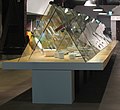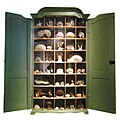Portal:Museums
The Museums Portal
A museum (/mjuːˈziːəm/ mew-ZEE-əm) is an institution dedicated to displaying and/or preserving culturally significant objects. Many museums have exhibitions of these objects on public display, and some have private collections that are used by researchers and specialists. Compared to a library, a museum hosts a much wider range of objects and usually focus around a specific theme such as the arts, science, natural history, local history, and other topics. Public museums that host exhibitions and interactive demonstrations are often considered to be tourist attractions, and many museums attract large numbers of visitors from outside their host country, with the most visited museums in the world regularly attracting millions of visitors annually.
Since the establishment of the earliest known museum in ancient times, museums have been associated with academia and the preservation of rare items. Museums originated as private collections of interesting items, and not until much later did the emphasis on educating the public take root. (Full article...)
Selected museum
The Guggenheim Museum Bilbao is a museum of modern and contemporary art designed by Canadian-American architect Frank Gehry, and located in Bilbao, province of Biscay, Spain. The museum was inaugurated on 18 October 1997 by King Juan Carlos I of Spain, with an exhibition of 250 contemporary works of art. Built alongside the Nervion River, which runs through the city of Bilbao to the Cantabrian Sea, it is one of several museums belonging to the Solomon R. Guggenheim Foundation and features permanent and visiting exhibits of works by Spanish and international artists. It is one of the largest museums in Spain.
A work of contemporary architecture, the building has been hailed as a "signal moment in the architectural culture", because it represents "one of those rare moments when critics, academics, and the general public were all completely united about something", according to architectural critic Paul Goldberger. The museum was the building most frequently named as one of the most important works completed since 1980 in the 2010 World Architecture Survey among architecture experts. (Full article...)
Selected interior image
Selected general article
A Collections Management System (CMS), sometimes called a Collections Information System, is software used by the collections staff of a collecting institution or by individual private collectors and collecting hobbyists or enthusiasts. Collecting institutions are primarily museums and archives and cover a very broad range from huge, international institutions, to very small or niche-specialty institutions such as local historical museums and preservation societies. Secondarily, libraries and galleries are also collecting institutions. Collections Management Systems (CMSs) allow individuals or collecting institutions to organize, control, and manage their collections' objects by “tracking all information related to and about” those objects. In larger institutions, the CMS may be used by collections staff such as registrars, collections managers, and curators to record information such as object locations, provenance, curatorial information, conservation reports, professional appraisals, and exhibition histories. All of this recorded information is then also accessed and used by other institutional departments such as “education, membership, accounting, and administration."
Though early Collections Management Systems were cataloging databases, essentially digital versions of card catalogs, more recent and advanced systems are being used to improve communication between museum staff and to automate and manage collections-based tasks and workflows. Collections Management Systems are also used to provide access to information about an institution's collections and objects to academic researchers, institutional volunteers, and the public, increasingly through online methods. (Full article...)
Did you know...
- ... that the Richard Childress Racing Museum is located in the former team workshop in which Richard Childress Racing won six NASCAR Cup Series championships and 58 races?
- ... that squatters in Hamburg briefly occupied the former Erotic Art Museum?
- ... that the only known copies of the oyster dress designed by Alexander McQueen for his collection Irere are owned by the Metropolitan Museum of Art and Kim Kardashian?
- ... that when the National Museum of Vanuatu opened its new building in 1995, a specially selected pig was sacrificed?
- ... that Carl Cotton was the first black taxidermist to work at the Field Museum of Natural History after being hired in 1947?
- ... that the Jersey Maritime Museum displays a 7.5-million-stitch tapestry depicting life under Nazi occupation that was worked on by thousands of islanders?
Get involved
For editor resources and to collaborate with other editors on improving Wikipedia's Museums-related articles, see WikiProject Museums.
Selected exterior image
Selected type of museum

A maritime museum (sometimes nautical museum) is a museum specializing in the display of objects relating to ships and travel on large bodies of water. A subcategory of maritime museums are naval museums, which focus on navies and the military use of the sea.
The great prize of a maritime museum is a historic ship (or a replica) made accessible as a museum ship, but as these are large and require a considerable budget to maintain, many museums preserve smaller or more fragile ships or partial ships within the museum buildings. Most museums exhibit interesting pieces of ships (such as a figurehead or cannon), ship models, and miscellaneous small items associated with ships and shipping, like cutlery, uniforms, and so forth. (Full article...)
In the news
- 12 May 2024 –
- Forty-nine Vatican Museums employees start an unprecedented labor dispute over unfair and poor working conditions against the Vatican's Pontifical Commission. (Reuters)
- 6 May 2024 –
- The 2024 Met Gala takes place at the Metropolitan Museum of Art in New York City with the theme "The Garden of Time", celebrating the Met's exhibit Sleeping Beauties: Reawakening Fashion. (Vanity Fair)
Subcategories
Subtopics
Lists
- Museums
- Most visited museums (by region)
- Art museums: most visited, largest
Types
- Art museum
- Agricultural museum
- Archaeology museum
- Architecture museum
- Artillery museum
- Aviation museum
- Biographical museum
- Cabinet of curiosities
- Ceramics museum
- Children's museum
- Community museum
- Computer museum
- Design museum
- Dime museum
- Ecomuseum
- Economuseum
- Ethnographic village
- Farm museum
- Fashion museum
- Folk museum
- Food museum
- Green museum
- Hair museum
- Hall of Memory
- Heritage centre
- Historic house museum
- Human rights museum
- Imaginarium
- Interpretation centre
- Jewish museum
- Lapidarium
- Lighthouse museum
- Living museum
- Local museum
- Maritime museum
- Migration museum
- Mobile museum
- Museum ship
- National history museum
- Natural history museum
- Open-air museum
- Palace museum
- Postal museum
- Prefectural museum
- Print room
- Private museum
- Regimental museum
- Schatzkammer
- Science fiction libraries and museums
- Science museum
- Sex museum
- Sculpture garden
- Technology museum
- Textile museum
- Torture museum
- Toy museum
- Transport museum (list)
- University museum
- Virtual museum
- Wax museum
- Writer's home
Related
Associated Wikimedia
The following Wikimedia Foundation sister projects provide more on this subject:
-
Commons
Free media repository -
Wikibooks
Free textbooks and manuals -
Wikidata
Free knowledge base -
Wikinews
Free-content news -
Wikiquote
Collection of quotations -
Wikisource
Free-content library -
Wikiversity
Free learning tools -
Wiktionary
Dictionary and thesaurus







































































